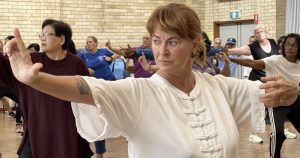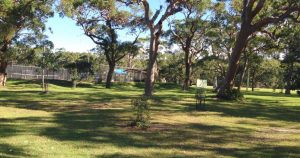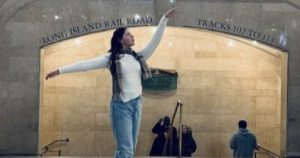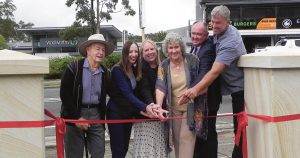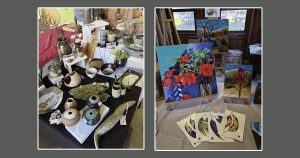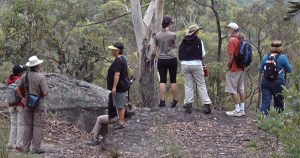42-year-old Ray Morcomb has been training in karate for virtually a lifetime.
Hailing from Pennant Hills, the black-belt Sensei was born with a vision impairment that classifies him as legally blind. But this has never held him back, in fact it’s done the opposite. Ray was inspired by karate as a child watching a Bruce Lee film with his brother.
“I was getting bullied a lot at school, and I was small, really small when I was little. I was thinking about training martial arts and then for Christmas my grandfather bought us an old VHS videotape of Bruce Lee’s
Fists of Fury. I was just so overwhelmed with his movements, his skill, everything he did,” he explains.
Ray took up karate at the tender age of eight, started with an instructor at 16, and by 19, he was professionally teaching and coaching.
Before he knew it, he shot through the ranks in the Japanese sport, travelling across the globe to compete and win in both able-bodied and disabled tournaments.
“I’ve been throughout Europe, Asia, South Africa, the US, mostly Japan, where I’ve been 16 times, training and competing. Now I get to go over to do coaching too, which is so cool,” he said.
Ray revealed to the Galston, Glenorie & Hills Rural Community News that his proudest achievement came in 2012 at the World Championships in France, after he was asked to perform a solo kata demonstration between the bronze medal and gold medal matches.
“The World Karate Federation were advertising that they were going to start doing disability karate. I went over to Germany in 2010, where they held this first event for karate athletes with disability, and I won gold in my category. It was there I got to meet the President of the International Olympic Committee and the President of the World Karate Federation.
They said they were going to have a huge World Championships in Paris in 2012, and they were going to run a karate demonstration event. I was a seasoned competitor at that point, but I wasn’t looking to compete any more. I was teaching and coaching, married and I was moving into a different phase of my life. But I was like yeah okay, I’ll do this,” he said.
Ray admitted that despite his nerves, the opportunity felt like “a dream”.
“When I got out there, there were 18, 000 spectators. I just thought this is insane. I couldn’t feel my legs, everything kind of rushed to my head, but it also felt like magic. At that point I’d been training karate for 20 or so years, and it all just seemed to come together at the right moment. It definitely gave me a bit of a name in the karate world from then on. Then two years later they continued the disability karate, and it actually made it to the World Championships as a legitimate category, which I was also able to win,” he said.
Ray’s admirable competitive success has not led him astray from his other passion, coaching. The karate Sensei runs Evolution Martial Arts, based in Thornleigh and Pennant Hills, where not only does he pass on his expert knowledge in the sport, but also aims to make both kids and adults physically and mentally stronger.
“I wanted to teach since I was about 9 or 10. I started working with my own instructor when I was 16,” he said.
Ray explained how he pushes all of his students to “stretch their boundaries” and “become more comfortable with being uncomfortable”.
“I’m trying to give them attributes of karate and martial arts that are also going to make them strong in other areas. I want to teach the kids self-defence and how to stick up for themselves, but I also have a really, really big focus on mental health.
Many kids come from good environments but are being crippled with depression and anxiety. My approach is to consider what it is they are dealing with alongside my own knowledge and skill set in martial arts, but I’m also using my own journey with vision disability and the hurdles I’ve overcome to bring them on board,” he said.
“Karate is all about persevering. Keep training, keep learning, keep improving, it’s a metaphor for life. The old karate masters used to say that karate is life, and I remember I just thought, that’s pretty crazy. But I think what they were really trying to say is the work ethic, getting up in the morning to go train, the way you approach everything, attention to detail, slowing down, that is actually all a part of life.”


